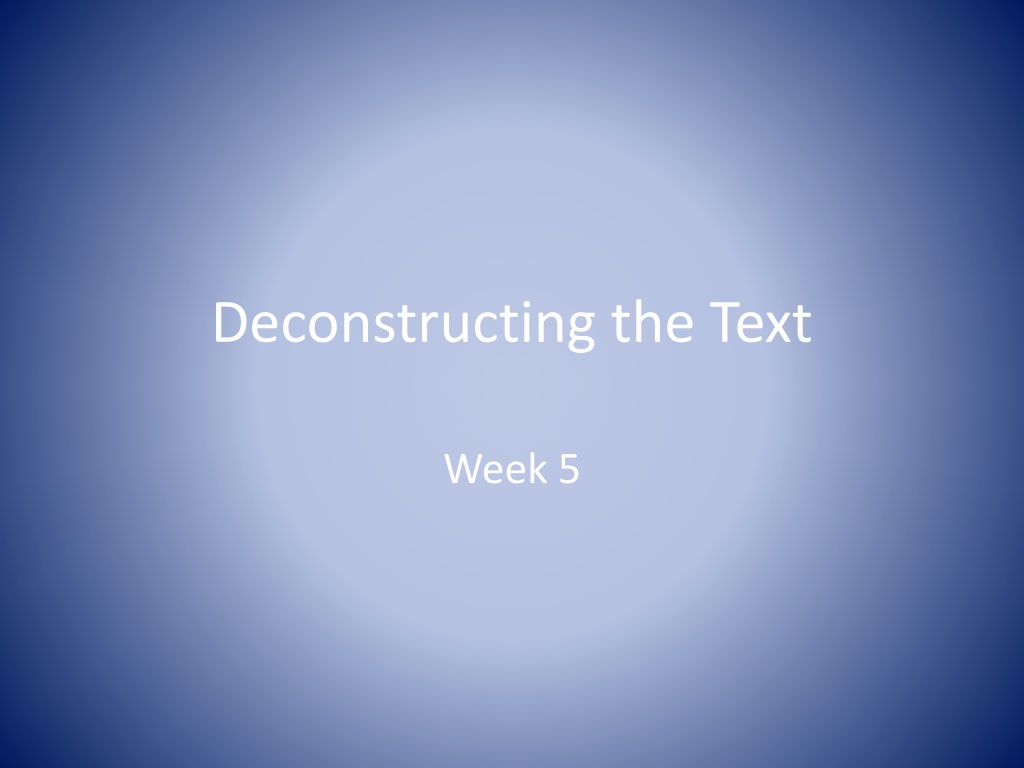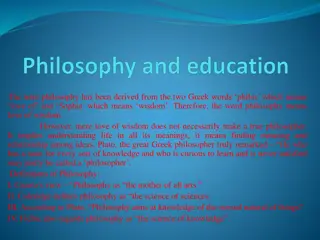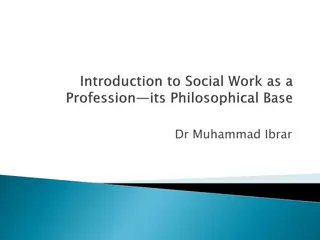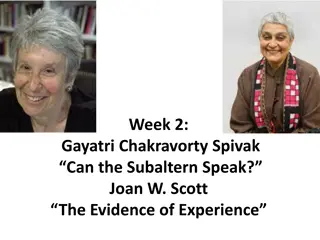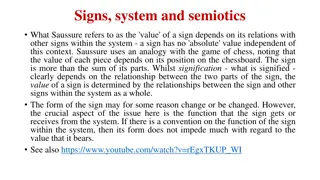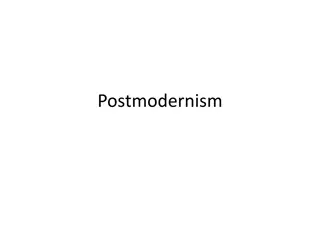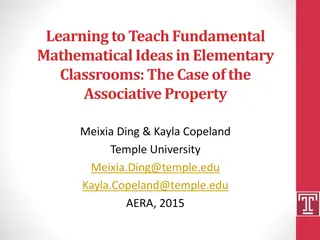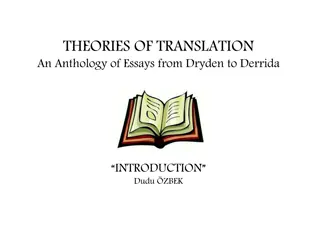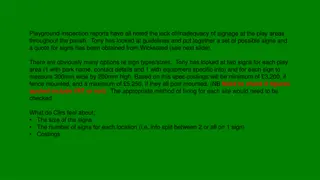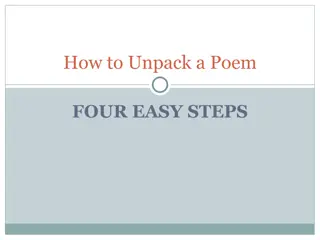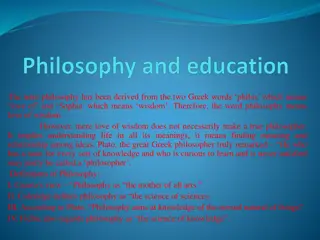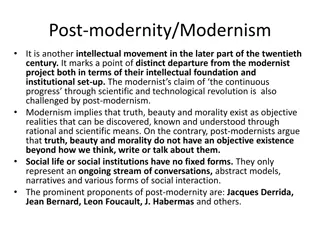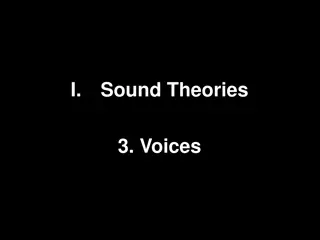Unpacking Deconstruction: Signs, Slippage, and Derrida's Philosophy
This content delves into the concept of signs, signifiers, and slippage while providing an overview of deconstruction, as outlined by prominent figures like Jacques Derrida, Roland Barthes, and others. Explore the fluid nature of meaning in texts and the challenges of assigning fixed interpretations in literary analysis.
Download Presentation

Please find below an Image/Link to download the presentation.
The content on the website is provided AS IS for your information and personal use only. It may not be sold, licensed, or shared on other websites without obtaining consent from the author. Download presentation by click this link. If you encounter any issues during the download, it is possible that the publisher has removed the file from their server.
E N D
Presentation Transcript
Deconstructing the Text Week 5
Aims to revise the notion of signs and signifiers; to introduce the idea of slippage; to give an overview of deconstruction: its traits and methodology
The word sign [signe] designates the whole signified [signifi ] designates the concept and signifier [signifinant] designates the sound image
Derridas Definition When asked "What is deconstruction?" Derrida replied, "I have no simple and formalisable response to this question. All my essays are attempts to have it out with this formidable question"
Other Definitions "It's possible, within a text, to frame a question or undo assertions made in the text, by means of elements which are in the text, which frequently would be precisely structures that play off the rhetorical against grammatical elements." (Paul de Man) "the term 'deconstruction' refers in the first instance to the way in which the 'accidental' features of a text can be seen as betraying, subverting, its purportedly 'essential' message" (Richard Rorty 1995). David B. Allison defines deconstruction as a way of uncovering the questions behind the answers of a text or tradition. a radical form of structuralism, pioneered by the French philosopher Jacques Derrida, which views text as a decentred play of structures, lacking any ultimately determinable meaning.
Barthes Contribution Through analysis of the internal structure of a text, particularly its contradictions, deconstructionists demonstrate the existence of subtext meanings - often not those that the author intended - and hence illustrate the impossibility of attributing fixed meaning to a work. The French critic Roland Barthes originated deconstruction in his book Mythologies 1957 in which he studied the inherent instability between sign and referent in a range of cultural phenomena, including not only literary works but also advertising, cookery, wrestling, and so on.
Derrida: What deconstruction is NOT Deconstruction is not a method and cannot be transformed into one What deconstruction IS "an unclosed, unenclosable, not wholly formalizable ensemble of rules for reading, interpretation and writing." Deconstruction takes place, it is an event
Deconstruction: The Bluffer's Guide Step 1 --Select a work to be deconstructed. This is called a "text" and is generally a piece of text, though it need not be. Step 2 --Decide what the text says. This can be whatever you want, although of course in the case of a text which actually consists of text it is easier if you pick something that it really does say. This is called "reading". Step 3 --Identify within the reading a distinction of some sort. It is a convention of the genre to choose a duality, such as man/woman, good/evil, earth/sky, chocolate/vanilla, etc. Step 4 --Convert your chosen distinction into a "hierarchical opposition" by asserting that the text claims or presumes a particular primacy, superiority, privilege or importance to one side or the other of the distinction. Step 5 --Derive another reading of the text which contradicts or undermines the original reading or the ordering of the hierarchical opposition.
Deconstruction: The Bluffer's Guide Step 1 --Select a work to be deconstructed. This is called a "text" and is generally a piece of text, though it need not be. Little Bo Peep has lost her sheep. Step 2 --Decide what the text says. This can be whatever you want, although of course in the case of a text which actually consists of text it is easier if you pick something that it really does say. This is called "reading". The text reveals the openness of meaning, and we will locate those avenues of meaning and live the plurality of the text. We will observe the connotations of the secondary meanings and we will take the text as it is, without speaking of the author, nor of the literary history of that text. Step 3 --Identify within the reading a distinction of some sort. It is a convention of the genre to choose a duality, such as man/woman, good/evil, earth/sky, chocolate/vanilla, etc. "Lost" is one of those words which calls up its apparent opposite. It has no meaning without its counterpart and even within the word it divides and subdivides to reveal the duplicity of language. The ambiguity lies in the Latin "laus" meaning "praise". Here we have a slippage between the signifier and the signified. Step 4 --Convert your chosen distinction into a "hierarchical opposition" by asserting that the text claims or presumes a particular primacy, superiority, privilege or importance to one side or the other of the distinction. Etymologically we see that "lost" implies not only praise, but also fame and renown. This is a positive rooted in the word that creates a transition between meanings. Step 5 --Derive another reading of the text which contradicts or undermines the original reading or the ordering of the hierarchical opposition. The torn meaning continues in "los", (now obsolete) which in Russian means "elk". The word divides from itself, and yet holds meanings close: the similar and the dissimilar exist together. The "sheep" (read cloven- footed animal) is both lost and, by implication, found and loved.
The Critic As Host The words 'host' and 'guest' go back in fact to the same etymological root: ghos-ti, stranger, guest, host, properly 'someone with whom one has reciprocal duties of hospitality.' The modern English word 'host' in this alternative sense comes from the Middle English (h)hoste, from Old French, host, guest, from Latin hospes (stem hospit-), guest, host, stranger. The 'pes' or 'pit' in the Latin words and in such modern English words as 'hospital' and 'hospitality' is from another root, pot, meaning 'master'. The compound or bifurcated root ghos pot meant 'master of guests', 'one who symbolizes the relationship of reciprocal hospitability.' as in the Slavic gospodi, Lord, sir, master. 'Guest', on the other hand, is from Middle English gest, from Old Norse gestr, from ghos-ti, the same root as for 'host'. A host is a guest, and a guest is a host. A host is a host. The relation of household master offering hospitability to a guest and the guest receiving it, of host and parasite in the original sense of 'fellow guest' is in closed within the word 'host' itself. A host in the sense of a guest, moreover, is both a friendly visitor in the house and at the same time an alien presence who turns the home into a hotel, a neutral territory. Perhaps he is the first emissary of a host of enemies (from Latin hostis [stranger, enemy]), the first foot in the door, to be followed by a swarm of hostile strangers, to be met only by our own host, as the Christian deity is the Lord God of Hosts. The uncanny antithetical relation exists not only between pairs of words in this system, host and parasite, host and guest, but within each word in itself. It reforms itself in each polar opposite when that opposite is separated out, and it subverts or nullifies the apparently unequivocal relation of polarity which seems the conceptual scheme appropriate for thinking through the system. Each word in itself becomes separated by the strange logic of the 'para', membrane which divides inside from outside and yet joins them in a hymeneal bond, or allows an osmotic mixing, making the strangers friends, the distant near, the dissimilar similar, the Unheimlich heimlich, the homely homey, without for all its closeness and similarity, ceasing to be strange, distant, dissimilar. What does all this have to do with poems and the reading of poems? It is meant, first, as an 'example' of the deconstructive strategy of interpretation, applied in this case, not the text of a poem but to the cited fragment of a critical essay containing within itself a citation from another essay, like a parasite within its host. The 'example' is a fragment like those miniscule bits of some substance which are put in a tiny test tube and explored by certain techniques of analytical chemistry. To get so far or so much out of a little piece of language (and I have only begun to go as far as I mean to go), context after context, widening out from these few phrases to include as their necessary milieus all the family of Indo-European languages, all the literature and conceptual thought within those languages, and all the permutations of our social structures of household economy, gift-giving and gift-receiving this is a polemical implication of what I have said. It is an argument for the value of recognizing the great complexity and equivocal richness of apparently obvious or univocal language, even the language of criticism, which is in this respect continuous with the language of literature. An extract from J Hillis Miller, "The Critic As Host" (1977)
